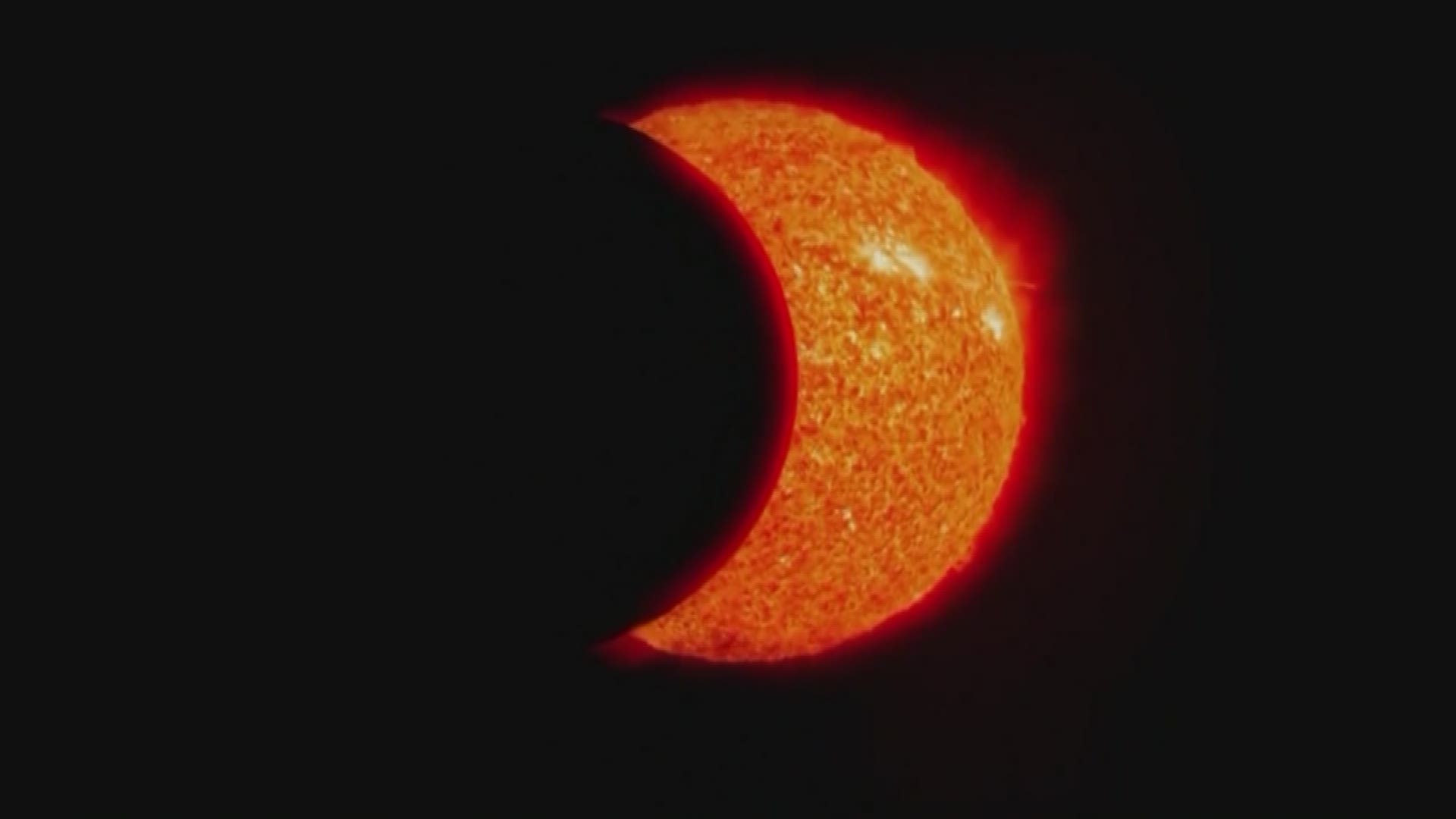
There is more to the story, and in order to understand it, a look at one of space’s curiosities is necessary. Occasionally, even when the three bodies are perfectly aligned, the smaller-than-usual Moon won’t completely block the Sun, leaving a ring, or annulus, of the Sun showing. However, because the distance between the Moon and Earth varies, the Moon will sometimes appear a little larger or smaller than its average size. If the three are perfectly aligned, then the Moon can completely cover the Sun, creating a total solar eclipse. If the three bodies are not quite aligned, then the Moon may block part of the Sun in what is called a partial solar eclipse. Solar eclipses can only happen during the new phase of the Moon, when the Moon lines up between Earth and the Sun. We can see total solar eclipses thanks to two phenomena: the orbital motions of the Earth and the Moon, and a cosmic coincidence that renders the Sun and Moon to appear similar in size as seen from Earth. Jeffrey Hall, himself a solar astronomer, said, “A total solar eclipse is an amazing-even life-changing-experience for anyone who witnesses it, and part of Lowell's mission is to communicate the excitement and wonder of events like this to everyone.” He continued, “We are very pleased to be collaborating with the City of Waco, Baylor University, and Discovery to enhance everyone's enjoyment of this spectacular event.” Lowell Observatory astronomers have long studied the Sun, and observatory scientists and educators hosted a similar event in Oregon for the 2017 total solar eclipse.
#Lunar eclipse 2019 texas professional
Barbara Castanheira-Endl, Baylor Senior Lecturer of Physics, notes, “As a professional astronomer, I find that looking at stars through world-class telescopes can’t approach the visceral experience of gazing at our Sun as it is eclipsed by the Moon.” Members of Baylor University’s Department of Physics will share this experience with local and international communities by hosting teacher training workshops and a scientific conference leading up to the April 8, 2024, event.ĭr. Here, event participants will enjoy an unobstructed view of the Sun in the sky. “Waco offers numerous amenities and activities, and we encourage those participating in this historic event to make it a long weekend and enjoy all that Waco has to offer.”Įclipse Over Texas: Live from Waco activities will take place on the South Plaza and Touchdown Alley areas of Baylor University’s McLane Stadium, which is located on the banks of the Brazos River. “The City of Waco looks forward to welcoming our residents and visitors in joining us in experiencing the 2024 total solar eclipse,” said Dillon Meek, Mayor of the City of Waco.

This, combined with historically excellent weather in April, as well as easy accessibility, makes Waco an ideal location for an eclipse event. Waco sits very close to the middle of the path of totality. “Discovery is excited to collaborate with Lowell Observatory, the City of Waco and Baylor University to bring this moment in time to people around the world.” It’s important to document these times to capture the feeling for years to come,” said Scott Lewers, Executive Vice President of Multiplatform Programming, Factual & Head of Content, Science. “There is nothing like the collective experience of a moment like this to bring the world together. CDT.ĭiscovery will broadcast the event on their linear and digital networks. This will last for four minutes and 13 seconds, after which the Sun will begin its gradual move out of the Moon’s shadow, ending at 2 p.m. The Sun’s surface will gradually be covered until totality begins at 1:38 p.m.

The partial phase of the solar eclipse will begin at 12:20 p.m. Danielle Adams, Chief Marketing and Revenue Officer at Lowell Observatory.Įclipse Over Texas: Live from Waco will consist of presentations by astronomers and science educators, interactive activities, and safe telescope viewing of the Sun as it progresses through the eclipse. “If you missed experiencing totality during the 2017 Great American Eclipse, you have another chance in 2024 to see for yourself the silvery filaments of the solar corona emanating from the velvet hole in the sky that is left when the Moon fully eclipses the Sun,” said Dr.

This will include an onsite celebration at Baylor University’s McLane Stadium in Waco, as well as virtual programming that people around the world may view. Lowell Observatory is teaming with the City of Waco, Baylor University and Discovery on a public event, Eclipse Over Texas 2024. Media Contact: Lori Fogleman, Baylor University Media and Public Relations, 25įollow us on Twitter: Texas (April 8, 2022) – A total solar eclipse will take place on April 8, 2024, and Texas is an ideal location for viewing this rare celestial display.


 0 kommentar(er)
0 kommentar(er)
